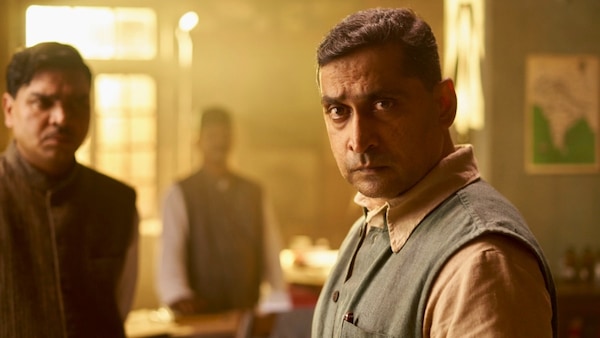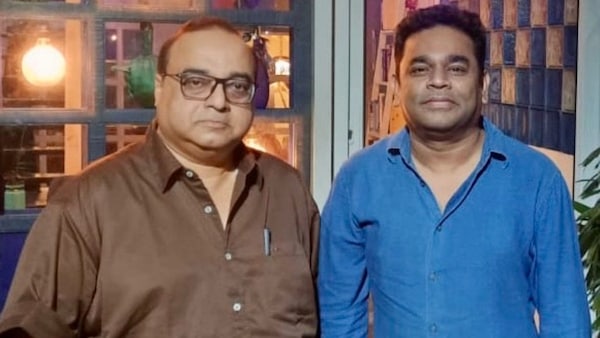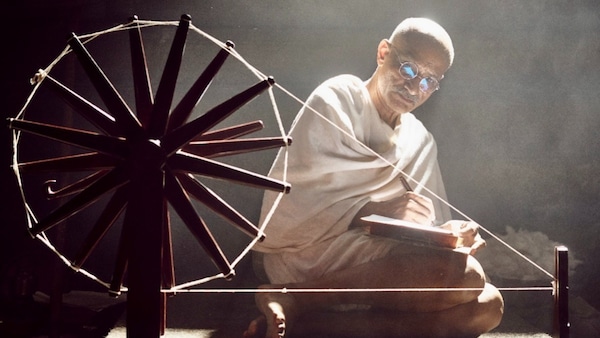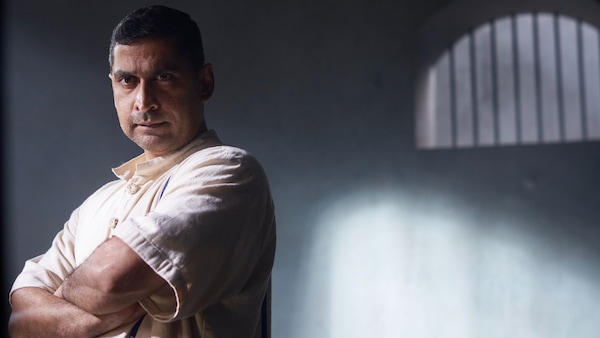Exclusive! Gandhi Godse - Ek Yudh’s Chinmay Mandlekar: Controversies can be created out of anything
The Rajkumar Santoshi directorial will hit the theatres on January 26. Ahead of the release, actor Chinmay Mandlekar - who plays Nathuram Godse in the film, speaks with OTTplay

Last Updated: 07.21 AM, Jan 15, 2023
Releasing this Republic Day, Gandhi Godse - Ek Yudh is seen as veteran filmmaker Rajkumar Santoshi’s major comeback film. The narrative relies on a fictional situation, where Mahatma Gandhi survives Nathuram Godse’s attack on him, and the two later meet in a prison cell to engage in what can be described as a fiery ‘vicharon ka yudh’. The film’s recently launched trailer has already stirred up controversies, but the director maintains that the film ‘sympathises with both Gandhi and Godse’. Rather, the period drama explores what would have happened if Gandhi had lived after Godse’s assassination attempt. Gandhi’s character is played by actor Deepak Antani.
Meanwhile, playing the role of Godse in the film is noted screen and stage actor Chinmay Mandlekar. A well-known face in the Marathi entertainment industry, Chinmay was most recently in The Kashmir Files as Farooq Malik ‘Bitta’. In an exclusive conversation with OTTplay, the actor talks about playing Godse on screen, his experience of working with the legendary director, what theatre taught him as an actor and his views on OTT platforms. Excerpts:
Q. Your character in The Kashmir Files (Farooq Malik ‘Bitta’) is a memorable one, and now you’ll be seen as Nathuram Godse in Gandhi Godse - Ek Yudh. As an actor, does that put pressure on you to make an impact on screen every time?
A. More than the pressure to make an impact, it imbibes the sense of responsibility in me. As an actor, I consider this the golden opportunity to portray a character, which is ideologically so different from what I played in The Kashmir Files. They are two personalities that are poles apart. So, it becomes a bigger responsibility for me to portray both the characters as honestly and realistically as possible. Every film we do is special for us, and we want to give our best to it. In fact, these two movies were shot almost simultaneously in 2021. So, to be truthful to both the scripts, and maintain the dynamics and intensity of each was crucial.
Q. Given the country’s current political environment, playing the role of Godse on screen may create controversies or at least lead to mixed opinions. Does that make you apprehensive, now that the film is releasing soon?
A. The arrow has already left the bow, so there is no point worrying about what it could trigger after the film hits the theatre. I should have probably thought about it much earlier. But, of course, I am both nervous and excited about this release. It’s one of the biggest films that I have done so far in my career of 15 years. It was my dream to work with Rajkumar Santoshi, which has finally come true. It’s a big moment for an artist like me. Controversies can be created out of anything, but that does not mean that creative people will stop working on projects that they truly believe in. For instance, the story of The Kashmir Files had to be told, whether or not it risked resulting in controversies and debates.
Q. Tell us about your experience of working with Rajkumar Santoshi
A. Rajkumar sir is a perfectionist. He has an eye for detail that left me in awe. During the shooting of Gandhi Godse - Ek Yudh, there was this one incident when the button of my kurta didn’t look like it belonged to that era. So, he halted the shoot for the day. His passion, thought process and dedication toward his craft is very inspiring. It was a dream from the early days of my career to work with him, and this film gave me that opportunity. It’s also an honour to work with industry greats like AR Rahman and Resul Pookutty. This couldn’t have gotten better.

Q. This isn’t the first time that you’re playing a character from the past. In fact, most of your recent projects - be it Fatteshikast, Pawankhind or Sher Shivraj - are based on historical figures. Is that a deliberate move?
A. Not really. All these have actually just happened to me. And I consider myself lucky to play Chhatrapati Shivaji Maharaj on screen several times. There are four more from this franchise in the pipeline, and we are shooting for the fifth film. It’s also because, compared with the 1990s and 2000s, a lot more films and television shows are now made on historical figures and stories. This trend has also led to many biopics, lately.
Q. RRR, a Telugu film, has made India proud at Golden Globes 2023. Your career too being primarily centred on the Marathi industry, how do you think winning such a prestigious award would influence the country’s regional film industries?
A. I think it’s a very happy moment for Indian cinema as a whole. The four south industries - Tamil, Malayalam, Telugu and Kannada - have always been the trendsetters. They make great, inspiring movies, with some remarkable performances, bigger than Bollywood at most times. The Marathi industry too has offered some compelling films in recent years, and so has its Bengali counterpart. But we are probably yet to see the best of Odia, Gujarati and the other regional industries. And an international award like this definitely sets the bar high for all.

Q. Your take on OTTplay platforms. Do you think this medium has been able to nurture hidden talents?
A. There’s no doubt that OTT platforms are a major boost for every creative person in TV and cinema. It has given a level playing field for every artiste. Stories that couldn’t be told through a film are now beautifully narrated via web shows. There is no difference between a star and an actor here. Every member of the cast and crew now have a space to prove their mettle. It’s a strong medium of storytelling that we all needed. I am currently involved with two new web series, and I have quite enjoyed working in them.

You’re a National School Of Drama graduate, who had an illustrious stint in Marathi theatre. Now that films have taken precedence, do you miss the stage?
A. Of course, I miss being on stage. Acting in a play gives you an inimitable experience that you cannot forget. Theatre is like your mother whom you would like to keep going back to. Currently, my hands are full and I have not been able to make time for theatre, but I am glad that my plays - Bechaki and Sukhanshi Bhandto Aamhi - are still running successfully. Theatre helps you develop an ear for understanding audience responses like none other. It’s a trait that helps you as an actor working for any medium.

